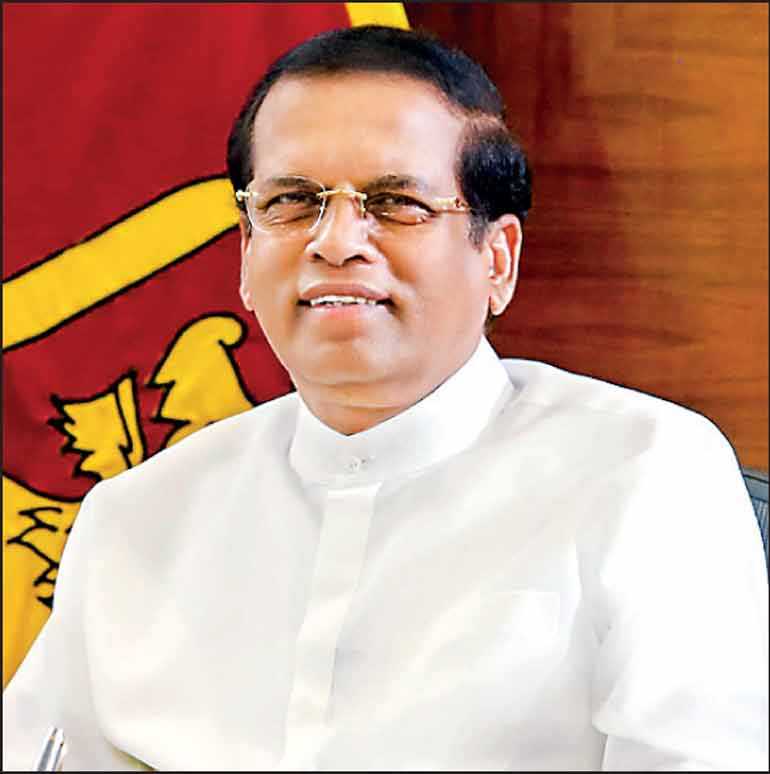Saturday Feb 14, 2026
Saturday Feb 14, 2026
Wednesday, 27 March 2019 00:00 - - {{hitsCtrl.values.hits}}

By Chathuri Dissanayake
President Maithripala Sirisena found fault with the Public Utilities Commission for creating the power shortage in the country during yesterday’s Cabinet meeting.
Discussing the power crisis in the country, the President said the PUCSL was directly to blame for the issue, as the regulator failed to approve the Long Term Generation Plan, while PUCSL engineers keep contact with owners of private power producers.
The President claimed that engineers in the PUCSL have even taken foreign trips with the owners of private power producers.
Minister Patali Champika Ranawaka however pointed out that the shortage the country was facing was predicted by him, through a Cabinet memorandum as early as 2017, Daily FT learnt.
To find a remedy for the situation, the Cabinet appointed a three-member Committee led by Power, Energy, and Business Development Minister Ravi Karunanayake. Cabinet Minister Kabir Hashim and Non-Cabinet Minister Dr. Harsha de Silva are also in the committee, Daily FT learnt.
The Committee is required to present a report after inquiring into the current situation, and present recommendations to address the shortage.
The PUCSL is, however, going ahead with their plan to file action against the CEB for power interruptions being carried out without the approval of the regulator.
Following a public call made on Monday to report power cuts experienced by consumers, the regulator has already received 30 complaints, and has sought legal advice to proceed with filing legal action, Daily FT learnt.
Meanwhile, the CEB, who started cloud seeding last week with foreign technical assistance, halted the exercise yesterday, CEB officials confirmed.
The CEB was hopeful of utilising the rain water created from the exercise to fill the reservoirs and carry out generation to meet the current power demand.
The PUCSL on Monday said it will take legal action against the CEB for carrying out scheduled power interruptions sans their approval, noting the move was illegal as per the conditions of the License agreement.
A Cabinet paper, recommending action to avoid the power shortage at the beginning of 2019, approved in August last year, was not implemented either, Daily FT learnt. The paper recommended the development of a power purchase scheme from standby power generators, both in private sector and Government institutions.
None of the projects planned in Long-Term Generation Plans since 2011 have been implemented, except for the tender called for a 300MW LNG plant in Kerawalapitiya, which should have been in operation by 2019.
In a letter written in March 2016, seen by the Daily FT, the Commission informed the Ministry Secretary Dr. B. M. S. Batagoda that the country could face capacity shortages in 2018/2019 and beyond under drought conditions, as generation demand was predicted to increase at 5.5% per annum during 2015-2022 period.
The PUCSL recommended that the Ministry implement a National demand side management program, develop planned conventional power plants on schedule, and expedite the grid integration of planned renewable energy-based plants.
The PUCSL, having received no response from the CEB, then wrote to the Ministry of National Policies and Economic Affairs in November 2016 to keep them abreast of the situation, with a note to be forwarded to the Cabinet Committee on Economic Management (CCEM).
Following the letters sent by the PUCSL, in June 2017, the Power and Renewable Energy Ministry wrote to the CEB, instructing them to immediately commence work on the power plants lined up in the Long Term Generation Plan, followed by a CEB Board Decision to urgently implement the schedule outlined by the Ministry.